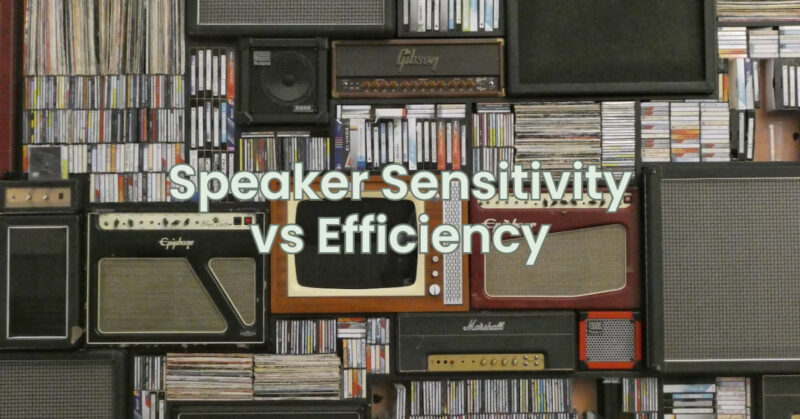When shopping for speakers or designing an audio system, you may come across terms like speaker sensitivity and efficiency. These specifications are crucial factors in determining the performance and power requirements of a speaker. In this article, we will delve into the concepts of speaker sensitivity and efficiency, exploring their relationship and understanding how they impact the overall audio experience.
Understanding Speaker Sensitivity: Speaker sensitivity refers to the sound pressure level (SPL) produced by a speaker when given a specific amount of power. It is typically measured in decibels (dB) and provides an indication of how loud a speaker can be. Higher sensitivity ratings mean that a speaker can produce louder sound levels with the same input power. Sensitivity is an essential specification to consider when selecting speakers for your audio system.
Exploring Speaker Efficiency: Speaker efficiency refers to how effectively a speaker converts electrical power into sound output. It is expressed as a percentage and represents the ratio of acoustic power (sound output) to electrical power (input). Efficiency indicates the speaker’s ability to convert power without wasting it as heat. Higher efficiency ratings mean that a speaker can produce more sound output using less electrical power.
The Relationship between Sensitivity and Efficiency: While sensitivity and efficiency are related, they are not interchangeable terms. The main difference lies in how they measure speaker performance. Sensitivity focuses on the loudness of sound produced, while efficiency relates to the power consumption and conversion.
Speakers with high sensitivity ratings tend to be more efficient, as they can produce louder sound levels using less power. This is advantageous in scenarios where the amplifier’s power output is limited, as high-sensitivity speakers can achieve satisfactory volume levels without straining the amplifier.
On the other hand, speakers with lower sensitivity ratings may require more power from the amplifier to achieve the same volume levels. These speakers may be less efficient, as they require a higher electrical input to produce the desired sound output. In such cases, using a more powerful amplifier becomes necessary to avoid distortion and ensure optimal performance.
Factors Affecting Sensitivity and Efficiency: Several factors can influence both speaker sensitivity and efficiency:
- Speaker Design: The design and construction of a speaker, including the materials used and the efficiency of the drivers, can impact sensitivity and efficiency. High-quality drivers, lightweight materials, and well-engineered designs tend to yield better sensitivity and efficiency.
- Driver Size: Generally, larger drivers can move more air and produce higher sound levels. As a result, speakers with larger drivers often exhibit higher sensitivity and efficiency. However, the overall design and quality of the driver play a crucial role in determining these factors.
- Crossover Design: The crossover network in a speaker divides the audio signal into different frequency ranges and directs them to specific drivers. A well-designed crossover ensures smooth transitions between drivers, optimizing sensitivity and efficiency across the frequency spectrum.
- Enclosure Design: The speaker enclosure influences how sound is generated and radiated. Properly designed enclosures can enhance sensitivity and efficiency by minimizing unwanted resonances, reflections, and phase cancellations.
Choosing the Right Balance: When selecting speakers for your audio system, it’s important to strike the right balance between sensitivity and efficiency, depending on your specific requirements and constraints. If you have a powerful amplifier or need to fill a large space with sound, speakers with lower sensitivity but higher efficiency might be suitable. On the other hand, if you have a low-powered amplifier or want to achieve high volumes without excessive power consumption, speakers with higher sensitivity would be more appropriate.
Conclusion: Speaker sensitivity and efficiency are important specifications to consider when evaluating speakers and designing audio systems. While sensitivity focuses on loudness and efficiency relates to power conversion, both factors impact the overall performance and power requirements of a speaker. Understanding the relationship between sensitivity and efficiency allows you to make informed choices, ensuring optimal sound quality and efficient power usage in your audio setup. Consider your specific needs, system requirements, and budget to strike the right balance and embark on an immersive audio journey.


